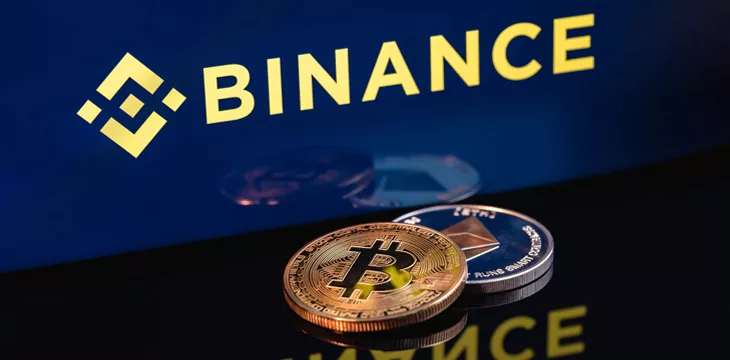|
Getting your Trinity Audio player ready...
|
Binance can’t dodge a U.S. class action suit for selling unregistered securities, while the exchange’s favorite stablecoin can’t dodge suspicions that its trading volume is artificially enhanced.
On March 8, the U.S. Court of Appeals for the Second Circuit reversed a lower court’s dismissal of a class action suit brought against Binance, its founder Changpeng ‘CZ’ Zhao and co-founders Yi He (CZ’s significant other) and Roger Wang in April 2020.
The suit alleged that Binance had never registered with the U.S. Securities and Exchange Commission (SEC) as a broker-dealer or securities exchange, but was nonetheless offering unregistered securities through the sale of a number of Ethereum-based tokens— ELF, EOS, FUN, ICX, OMG, QSP and TRX—that launched during the initial coin offering (ICO) craze of 2017-18.
In May 2022, a federal judge in the Southern District of New York dismissed the suit due to (a) the statute of limitations having run out and (b) Binance.com was not a U.S.-based exchange and thus not subject to U.S. securities laws.
Last Friday’s Appeals Court ruling overturned this dismissal, saying the plaintiffs had “adequately alleged that their transactions on the Binance exchange were domestic transactions and that therefore the application of federal and state securities laws here was not impermissibly extraterritorial.” The ruling added that “the parties became bound to the transactions in the United States, and therefore irrevocable liability attached in the United States.”
Binance had attempted to argue that the plaintiffs were trying to apply U.S. securities laws beyond its borders. The Appeals Court rejected this because the transactions “were matched [with token sellers], and therefore became irrevocable, on [Amazon Web Services] servers located in the United States.” The plaintiffs also “transacted on Binance from the United States, and pursuant to Binance’s Terms of Use, their buy orders became irrevocable when they were sent.”
Binance’s “intentional efforts to evade the jurisdiction of regulators” prompted the Appeals Court to offer this blistering backhand: “Even if the Binance exchange lacks a physical location, the answer to where that [buyer and seller] matching occurs cannot be ‘nowhere.'”
Binance’s insistence that it has no formal headquarters also played a role in the ruling. The Appeals Court noted that the server issue was the tipping point “given that Binance has not registered in any country, purports to have no physical or official location whatsoever, and the authorities in Malta, where its nominal headquarters are located, disclaim responsibility for regulating Binance.”
The extraterritoriality issue was a similar own goal. “Since Binance notoriously denies the applicability of any other country’s securities regulation regime, and no other sovereign appears to believe that Binance’s exchange is within its jurisdiction, the application of United States securities law here does not risk ‘incompatibility with the applicable laws of other countries.'”
The Appeals Court also rejected the timeliness argument, saying the plaintiffs’ claims “did not accrue until after they made the relevant purchases, and therefore their claims arising from purchases made during the year before filing suit are timely.”
The suit will now be sent back to the district court for further argument.
Third verse is the same as the first
While the Appeals Court ruling doesn’t have any direct bearing on the SEC’s 2023 complaint against Binance.US for offering unregistered securities, it’s yet another reputational nail in the U.S.-licensed exchange’s soon-to-be-lowered coffin, at least if the most recent joint status report released earlier this month is any indication.
The report informs the U.S. District Court for the District of Columbia that the two parties remain miles apart on several key issues. This includes the SEC’s ongoing lament that there are “certain key questions that BAM [the entities that oversee Binance.US] has been unable or unwilling to answer, and thus, the Court’s intervention is warranted.”
For instance, the SEC claims that expedited discovery has “cast doubt upon BAM’s claims that it exclusively controls the private keys, Customer Assets, and related transfers and withdrawals in its customer deposit and ‘hot’ (or internet-connected) wallets.” Much of the SEC’s case is based on evidence that CZ and international Binance entities had more control over Binance.US customer assets than Binance.US management.
Binance.US responded that it “occasionally” contacts international entities when it requires “technical assistance” but rejects the idea that this means CZ is calling the shots. Binance.US asked the court again to halt expedited discovery, claiming that the SEC “has not identified the slightest evidence that BAM’s customer assets are not secure or have been misused or dissipated in any way.”
Binance.US a dead exchange walking
Among the more interesting aspects of the joint status report were excerpts from a
December 2023 deposition of Binance.US COO Christopher Blodgett. Blodgett testified that the exchange’s “trading volumes and business more generally have imploded” following the SEC’s complaint, delivering “an almost near-mortal blow.”
Blodgett claimed the SEC suit had caused “immense reputational harm,” as evidenced by the roughly $1 billion worth of cash and digital assets that were pulled off Binance.US by customers fearful of an FTX-style disaster in the making. Revenue fell by 75%, operating costs “exploded,” and external legal fees are “in the neighborhood of $10 million.”
The SEC suit also “severely undermined institutional trust in our platform,” with the number of market-makers active on the exchange falling from over 20 to “less than five.” Banks were also skittish about offering fiat on-/off-ramps to Binance.US lest they receive “a nasty subpoena from the SEC.”
Blodgett said Binance.US had cut over 200 jobs—roughly two-thirds of its staff—impacting “many honest, hardworking Americans.” Blodgett apparently disavows Binance’s responsibility for the loss of these jobs, choosing instead to pin all blame on the SEC for having the cheek to believe Binance was subject to its regulatory oversight.
Never mind the admissions of rampant criminality contained in Binance’s $4.3 billion settlement with the U.S. Department of Justice (DoJ) last November. Never mind that CZ is currently waiting to learn how long he’ll have to spend in a U.S. prison cell for his years of flagrant lawbreaking. Never mind that countries worldwide continue to find Binance thumbing its nose at local laws. No, it’s the SEC’s fault, definitely.
Philippines reprieve?
One jurisdiction in which Binance appears to be getting at least a temporary pass is the Philippines, where the exchange has never received (nor even applied) for registration with the Philippine Securities and Exchange Commission (PSEC).
Last November, the PSEC initiated restricting access to Binance following years of urging
from the local think tank Infrawatch PH. The process of restricting access was expected to take three months, meaning the country’s telecom regulators would start blocking local access to the Binance website on or around February 29.
However, the PSEC later stated that this date could be delayed based on “feedback” from unspecified sources. As that deadline approached, a PSEC spokesperson told local media outlet BitPinas that the regulator was “evaluating all possible ramifications of the blocking, including implications to Filipino customer funds.”
On March 7, PSEC chair Emilio Aquino told the Inquirer it was delaying the ban due to turnover in the PSEC’s executive ranks. Commissioner Hubert Dominic B. Guevara recently took over as markets and securities regulation head, replacing the outgoing Kelvin Lester Lee. Aquino added that there was an “ongoing discussion” at the PSEC about Binance and he assured the Inquirer that the situation “will be addressed.”
And yet this executive turnover didn’t prevent the National Telecommunications Commission (NTC) from issuing an order for local internet service providers to block the websites and apps of the investment platform MiTrade, which, like Binance, lacks a license to operate in the Philippines.
That order even quoted Aquino thanking the NTC for “supporting our campaign against investment scams and other predatory financial schemes.” Aquino added that the PSEC and NTC “will continue to work closely together to take similar actions on other platforms facilitating illegal investment-taking activities and other predatory financial schemes.”
FDUSDetergent
Much has been made of the Tether (USDT) stablecoin’s role in token value bubbles past and present, particularly as USDT’s market cap recently topped $100 billion for the first time. Tether’s money printer tends to switch on whenever a token rally appears to be flagging, helping to fuel wash trading of BTC and other tokens on exchanges like Tether’s sister company Bitfinex.
Far less attention has been paid to FDUSD, the stablecoin that launched last July following the demise of Binance’s BUSD stablecoin. FDUSD trades almost exclusively on Binance and has always exhibited some questionable characteristics, but its volume on the exchange is now entering bad fan-fiction territory.
FDUSD’s market cap remains only slightly above $3.2 billion, and yet FDUSD’s 24-hour trading volume topped $21.5 billion on March 11. That means every FDUSD in existence is changing hands nearly seven times a day. Compare that to USDT, the volume of which on March 11 was only around 80% of its market cap.
More to the point: FDUSD is doing more than twice the daily volume of all of the vaunted BTC spot-based exchange-traded funds combined. And that’s on the BTC ETFs’ best days.
Some blockchain observers have repeatedly flagged this outsized volume as seriously suspect. Others point to the fact that FDUSD has only around 850 unique addresses, of which only six addresses hold all but 2.5% of issued FDUSD. Grab your dirty laundry because there’s a new wash trading detergent in town, and it’s seriously sudsy!
The expectation is that these shenanigans will halt once U.S. federal authorities finally appoint the independent compliance monitor that Binance agreed to install for the next three to five years as part of its November settlement. While the controversial law firm of Sullivan & Cromwell is said to have the inside track for this position, the feds need to shake their tailfeathers and get a proper fox inside this filthy chicken coop ASAP.
As for the rest of you, don’t forget to look up now and then so you don’t get crushed when BTC and other tokens crash back to earth.
Imagine the smell
We’d be remiss if we didn’t at least mention Binance’s wrong-footed celebration of International Women’s Day, which saw them tease a new ‘Eau de Binance’ perfume it called—wait for it—Crypto. The product was apparently intended to encourage more women to dive into the toxic male soup that is ‘crypto,’ but female reactions ranged from confusion to irritation at being patronized.
Binance’s CMO Rachel Conlan told TechCrunch the “tongue-in-cheek” perfume was the product of “an all-female team,” but that doesn’t seem to have impressed a great many female social media users who caught the promo. This is one of those situations where the goal is to ‘start a conversation,’ but the result is a collective STFU.
Follow CoinGeek’s Crypto Crime Cartel series, which delves into the stream of groups—from BitMEX to Binance, Bitcoin.com, Blockstream, ShapeShift, Coinbase, Ripple, Ethereum,
FTX and Tether—who have co-opted the digital asset revolution and turned the industry into a minefield for naïve (and even experienced) players in the market.

 04-25-2025
04-25-2025 





